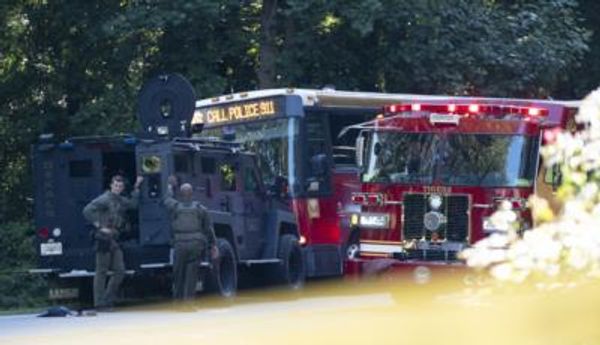The Salvation Army is evicting a 76-year-old Vietnam War veteran who worked for the organisation for 33 years.
Tony Jubb has lived in a Salvation Army-owned Narrabundah apartment complex for nearly 25 years.
He is one of many housing residents fearing for their futures after being given three months to vacate.

The Salvation Army intends to turn the ageing apartments into youth housing. Residents must leave by July 5.
Salvos Housing chief executive Chris Karagiannis said "no tenants will be left without a place to live", and caseworkers were helping find residents alternative accommodation.
Three of the residents in this story said they had not been assigned a caseworker a month after being notified.
Evicted after 25 years
Tony Jubb sits facing a wall on which hangs an akubra hat.
On a small display table of war medals sits an Anzac biscuit tin and framed certificate acknowledging his service in the Vietnam War.
There are photos of his daughter and granddaughter, who live in Melbourne, spread about the one-bedroom inner south flat.
In a softly spoken voice, Tony recounts his life story in extraordinarily sharp detail.
He said he worked for Salvos in different states, mostly managing retail shops, for three decades.
He worked as the caretaker for the Narrabundah apartment complex in his later years.
Tony found out he was being evicted via letter.
"We hadn't been told anything about it changing from the manager, so it was a very [big] surprise," he said.
Tony does not want to be moved into an aged care home, valuing his independence.
"If you move me into a home, within three months I will have passed away," he said.
'Traumatised' agoraphobic
Michael Grant's apartment is in disarray, a product of his frenzied and anxious state.
Moving into the complex six years ago allowed the 69-year-old to address his crippling agoraphobia and helped him remain sober.
Agoraphobia is a fear of unknown locations.
Michael was even able to shop by himself for the first time in 30 years at the local shops.

Opinion: It took me 30 years to go to the local shops, being evicted could change everything
"I'm still in shock. I'm still traumatised by the news," he said.
"I've just been in the most extraordinary state of frenzy, hardly eating, hardly sleeping.
"Agoraphobia is peculiarly situational, so there will be consequences if I have to move.
"I fear for both my mental health and my physical health."
Youth housing
Salvos Housing has operated the units as transitional - or temporary - housing since 2015, Mr Karagiannis said.
He said Salvos Housing was "transitioning the allocation of [the units] to another vulnerable cohort".
"There are many groups of people who need housing and the sad reality is, there is a lack of safe, secure and affordable housing for the most vulnerable people in our community," Mr Karagiannis said on May 8.
"So far, we have been successful in finding a suitable option for just under half the residents and expect the remainder to be relocated soon.
"We acknowledge that moving can be disruptive, but finding longer-term, safe and secure housing is a positive outcome for them."
People aged 12-24 are estimated to have made up nearly one-quarter of all homeless people on the 2021 census night, Australian Bureau of Statistics figures show.
The ACT government gave The Salvation Army $28.3 million to provide social housing and homelessness services over eight years. That contract is due to end on June 30.
An ACT government spokesperson said the matter was for The Salvation Army, and said "due to an ongoing procurement process we are unable to comment on contract arrangements".
'Totally powerless'
Samayah Jan lies on the couch in her flat, watching TV on a stand covered in piles of astrology books, feeling "totally powerless".
She said she is on a disability pension and has a diagnosis of schizophrenia. She pays Salvation Army $250 a week for the apartment.
Samayah said she spent eight months at Canberra Hospital after being found sleeping rough while pregnant.
"I was homeless on the street. It was awful, being attacked physically [and] I had a completely abandoned-type feeling," she said.
Samayah remained in hospital after giving birth to her third son, who is now in foster care, until she was given temporary housing at the Narrabundah complex about six months ago.

"It's a very sad situation but a lot of us here don't have anywhere else to go," Samayah said.
She said she was in government housing in Gordon with her two oldest children before leaving to the streets.
"Drains were coming up, flooding from toilet and electricity was really high-voltage. It just became a death trap so I decided homelessness was just as safe," Samayah said.
Her older children, now 18 and 14, moved to live with their fathers. In an ideal world, she would like secure housing so she can have more contact with her three children.
Homeless family of three
Self-employed sign-writer John Duncombe lives in a one-bedroom flat with his wife and six-year-old son.
The apartment is clean, with stylish artwork on the walls, and smells like incense.
The family moved in four years ago when they were homeless and living in a storage facility in Fyshwick.

John said the family was struggling to find an affordable private rental, and their caseworker sends rental listings they can find online.
"It's just a nightmare, absolute nightmare, and you're not going to find something that quickly," he said.
"They could [have told us] this 12 months ago."
Five-year waiting list
As of May 6, there were 3189 approved applications on the public housing waiting list, including 101 considered priority.
These priority applicants, which include people who are homeless, experiencing domestic violence or caring for children at risk, waited nearly eight months on average for a home.
Standard applicants wait five years and four months for a house.
There are fewer public housing properties in the territory than in 2012.
An ACT government spokesperson said "we have been working hard to build and buy more public housing homes to get people off the waitlist".
- Please send any inquiries to lanie.tindale@canberratimes.com.au.
- If this has brought up issues for you, please contact Lifeline on 13 14 11.







